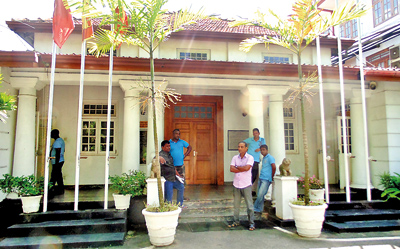News
Demarcation headache brings in new committee
A second committee will now look into the findings of the Delimitation Committee’s report into the demarcation of electoral boundaries in local government wards with time slipping away before final arrangements are due for next year’s elections.

Workers standing outside the Moratuwa Municipal Council. The Government is keen on holding elections to the local councils in March next year under a mixed elecotral system, but questions are being raised whether the Delimitation Commission can complete its task at least before the end of this year. Pic by Reka Tharangani
Decisions to be made from the report are already behind schedule. A Cabinet sub-committee has already been looking into issues faced by local bodies islandwide as a result of the demarcations.
This week, the Ministry of Local Government appointed a new five-member team to look into discrepancies regarding demarcation of boundaries and claimed shortcomings of the report submitted by the National Delimitation Commission (NDC) Chairman Jayalath Ravi Dissanayake.
The new committee is headed by the former commissioner-general of lands, Asoka Peiris, with four other members representing political parties: the United National Party’s A.S.M. Misbar, the United People’s Freedom Front’s K. Saliya, the Janatha Vimukthi Peramuna’s Upul Kumaraperuma and the Tamil National Alliance’s Professor B. Balasundarampillai.
Mr. Peiris said the new committee has been mandated by the ministry and provincial councils to study demarcation issues including appeals and objections by members of the public against the Delimitation Committee’s gazetted report.
“We will be making a field study into the complaints and concerns of the public. If it is necessary we will recommend that the ministry rearrange the boundary lines or the ward system recommended by the report,” he said.
The committee’s work has to be completed in three months, Mr. Peiris said, and its first meeting with Provincial Councils and Local Government Minister Faiszer Musthapha, prior to starting work, is scheduled for next week.
“We have to study the earlier report thoroughly so we can see where the problem is and what the main concerns of the public are over this issue. We are optimistic about meeting the challenges lying ahead of us,” he said.
Assisting this committee with technical input is a three-member team from the Elections Department, Solicitor-General’s Office and the Survey Department.
Elections Commissioner Mahinda Deshapriya says his department will need at least three months to prepare for the elections before they are called.
“The two committees will be functioning in parallel but the newly-appointed committee is based on the statutory frame while the cabinet sub-committee is for the government’s policies,” Mr. Musthapha said.
His top priority now was to hold the local polls as planned in March next year and he was of the view that setting up new councils would delay the election.
“If the Delimitation Committee recommends that these things can be dealt with before the election effectively we will see the possibilities of having new councils but my primary concern is holding the election without delay,” he said.
One demand, from Muslim parties, is to create a separate administrative district in Sainthamaruthu consisting of the areas of Sammanthurai, Pothuvil and Kalmunai.
Sri Lanka Muslim Congress (SLMC) General Secretary Hassan Ali said the government and Prime Minister Ranil Wickremasinghe had promised, before the August parliamentary polls, to set up a council in Sainthamaruthu, and the SLMC would continue to push for that.
“Even though we are in the Government we will pressure the Government to fulfil its promise,” Mr. Ali said.
Minister Musthapha, who is also the legal adviser to President Maithripala Sirisena, referred to an allegation that the demarcation report had been drafted to facilitate a certain political party’s electoral gains.
“There are concerns about the demarcation system and the way the boundaries have been divided into ward systems in which the minority community feels that its representation might be reduced significantly – we have to address those issues too,” he said.
If a unity government could not bring in proposed reforms at local level, Mr Musthapha questioned, how could the President carry out his determination to institute electoral reforms at national level?
“The President’s instruction was to get rid of the preferential vote system – linked to the Proportionate Representation system — and replace it with a representative accountable for the particular electorate in order to avoid internal party politics and corruption.
“We wanted to bring the 20th Amendment but we could not achieve that due to various reasons. The local council elections, however, can be a new beginning for Sri Lanka’s new political culture,” the minister said.
The Government has decided to hold the next local council elections in March next year under the mixed system where 70 per cent of the members will be elected from the first past the post system (FPP) and 30 per cent from PR.

